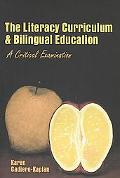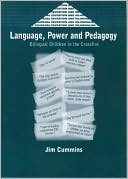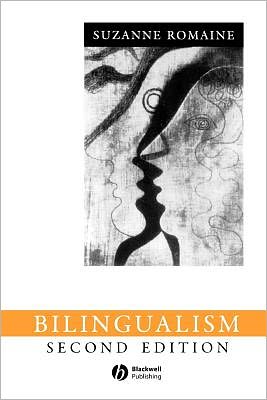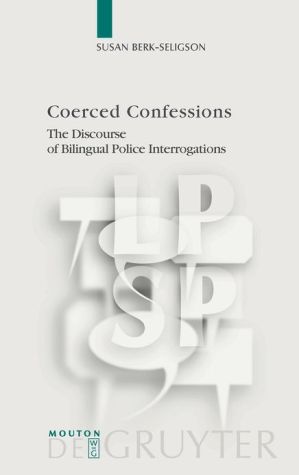Bilingual Aesthetics: A New Sentimental Education
Knowing a second language entails some unease; it requires a willingness to make mistakes and work through misunderstandings. The renowned literary scholar Doris Sommer argues that feeling funny is good for you, and for society. In Bilingual Aesthetics Sommer invites readers to make mischief with meaning, to play games with language, and to allow errors to stimulate new ways of thinking. Today’s global world has outgrown any one-to-one correlation between a people and a language; liberal...
Search in google:
An analysis of the changing status of bi- and multi-lingualness in relation to issues of citizenship, ethnicity, and diversity.
Bilingual aesthetics\ A new sentimental education \ \ By Doris Sommer \ Duke University Press\ \ ISBN: 0-8223-3344-9 \ \ \ Chapter One\ Choose and Lose \ The first joke is on the Cuban women who want to be American. One doesn't know enough English to take the required medical exam for immigration, while the other thinks she knows enough. You can just imagine these two in other ridiculous situations: getting busted for ordering "coca" (cola) at the corner store, or driving past the exit sign they discount as self-help advertising (exito), or even getting lost in the precise alphabetical order of phone books that hide people under second (and secondary) surnames. Immigrants and foreigners are funny; they make people laugh, especially-and this may sound strange-especially similar folks who mix languages and become the butt of jokes. That's the funniest part of it. Henny Youngman told Jewish jokes to Jewish audiences; Roberto G. Fernandez teases Cuban Americans with riffs that put them on and put them down as pitilessly as the playful choteo in Havana; Bert Williams made a spectacle of being black in both black and white spaces; Cheech and Chong poke fun at Latino angelinos in Los Angeles. They are not abject, despite a guilt-ridden Anglo interpretation of self-directed ethnic humor, but active in the game of shuttling between insider and outsider.\ Knowing more than one language is not necessarily risible, if you can afford the extras.Middle-class bilinguals almost always outperform monolinguals on tests of cognitive agility since thinking in simultaneous and competing codes trains people in multiple perspectives and uncharted possibilities. It is what linguists call creative "divergent thinking," as distinct from convergent thinking, which assumes that questions have one correct answer and which defines intelligence testing. For the elite and well educated, multilingualism is a decided advantage. It allows them to travel easily, to get good jobs, read books in original versions, sparkle in conversations between puns and private codes, and to enjoy the sheer virtuosity of knowing more than enough. Some researchers wonder what comes first, intelligence or bilingualism. Are bilinguals smart because they know two languages, or do they know two languages because they are smart? The question hardly takes stock of the range of native talents in whole communities that are bi- or multi- or monolingual. In any case, research from several disciplines agrees that intelligence and bilingualism go together.\ But the value of the more-than-one is discounted for the "popular classes," a term I take from Spanish to name poor and often dark people. The same researchers who notice the bilingual benefit for privileged students know the bilingual blues of the poor. The variable is the difference between high and low expectations among authorities. We know that predicting success will enhance performance, while low expectations can crush students. This damaging difference calls for a realignment of feeling, that is, a new sentimental education.\ Think of the difference between the cosmopolitan prince, played and directed by Sir Laurence Olivier, and popular Marilyn Monroe, in The Prince and the Showgirl (Warner Bros., 1957). He can switch from English to German and French thanks to an elite education and to the requirements of international intrigue. Political plots thicken (in London, 1910) when he stops a seduction scene with the luscious girl to make an urgent phone call to an ambassador. "Yes, I'm alone," he begins, "there's no one else here." Offended and half drunk, the showgirl pours herself another glass and toasts President Taft. By morning, his telephone orders to arrest dissidents (democratic forces working with the Americans, "You know what children the Americans are") have leaked to Olivier's son, the legitimate heir to the throne. The boy steals into his father's study and asks Marilyn to place a call. After she indiscreetly says that the King of Carpathia wishes to speak to the ambassador, he grabs the receiver and speaks freely, as his father did when he claimed to be alone in Marilyn's company, but imperfectly: "Vorstein ... er ist unseren Planen zuvorgekommen. Schlagen Sie dem Kaiser vor, dassich mein (inaudible) ... meines Vaters erzwungenes Exil sowie meine eigene Thron besteigung am funfzehnten August bekanntmache ... Ja ... Es ist aber notig, die bulgarische Armee marschbereit zu halten. Mehr kann ich jetzt nicht sagen. Ich danke Ihnen. Auf Wiedersehen." Afterward, with a smirk of satisfaction for the discreet maneuver, he thanks Marilyn and extends an invitation to his future coronation.\ -Oh, really? When is that? -Sixteen, eighteen, months. -Not sooner than that? -(delay) Sooner, Miss Mariner? -Yes, I speak German. I was born in Milwaukee.\ The punchline shows that the underestimated girl had understood every detail of the dispatch, the fast-forward date, the backup of the Bulgarian Army, and the filial treason. Tsk, tsk, that's no way to treat a father, even if the regent had already betrayed his own son. Decadent (but irresistible) Europe is on the brink of Oedipal disaster. And New World viewers probably enjoy the cathartic pleasures of being spared, from their distance of time, space, and moral register. It is a timely reminder of anti-imperial ethics. Maybe the movie viewers thought it was better to be simple, "childlike" and democratic like North American monolinguals who don't play dirty. ("In England we speak only English," the father demanded, just before his son's secret conversation in German.) But the contrast is too stark, and the audience knows it. Working-class Marilyn is no simpleton. What were the princes thinking? That class status is an indicator of intelligence, or that open and democratic spirits are easy targets for treason? Marilyn is a cure for un-American prejudices about "foreign" language incompetence.\ It is time we noticed that working-and also underemployed -bilinguals sparkle too, and for similar reasons to elite code switchers. Both know the risks of language and the magic of making contact when communication could have misfired. With an exquisite consciousness of conventions, and a keen skepticism about what can or should be said, bilinguals develop the everyday arts of maneuvering and self-irony.\ Some educators and politicians consider nonelite bilinguals to be damaged raw material that needs to be pressed into simple and transparent form before it can bear complexity. Attitudes toward bilingualism correlate quite well with politics, Suzanne Romaine observes, as support rises and falls with immigration quotas and as regimes tighten or loosen control of civil society. How many wars have been waged in the name of a single coherent language and culture? Curiously, Romaine adds, linguist and activist Noam Chomsky fails to see what language has to do with politics.\ Color is a clue. Today, language difference is a metonymy for racial hierarchies. It segments a population into majority and minorities. If it were not for color-coded linguistic differences, what could the language marker "Hispanic" or "Latino" mean in response to Anglo-centric questions of race? Latinos don't jump to congenital conclusions; they can lose one language too easily and to gain another takes effort. Starting with the bilingual advantage, immigrants face a linguistic paradox. Foreign languages are prized in elite education and dismissed for "foreigners," despite the cognitive advantages that linguists acknowledge as divergent thinking. The counterproductive pattern runs parallel to the paradox of declining health in the promised land for the children and grandchildren of sturdy immigrants.\ Melancholy Marilyn\ The white-out policy for "foreign" speech, along with a blame-the-victim approach to language loss, misses Ms. (Marilyn) Mariner's charms. She speaks English Plus, not English only. And she provokes a laugh of satisfaction among homeland viewers for outsmarting the Old World princes who imagined that we are monodimensional. Being "American," in her case and in many others, means adding one (home) culture to a national lingua franca (she was born in Milwaukee, is the explanation for both). Ms. Mariner stands up to the unsettled prince, sturdy on her doubled cultural ground. "I'm American," she dismissively answers his threat; "you can't do anything to me." Let's take a lesson from this pride in her complicated country, and from the laughter provoked by misprising it, to shake free from the habit of forcing "foreigners" to forget native languages. Cultural subtraction need not be the price of admission to this country. In fact, Alejandro Portes and Lingxin Hau recommend language maintenance, that is, "selective acculturation," because forced forgetfulness and the corollary disrespect of parents cannot yield strong societies. "The price of uniformity" is too high.\ Strange-not to say funny-as it sounds, subtraction continues to be the conventional logic of assimilation, throughout the Americas and beyond. It urges us to get past complexity, to choose one common denominator of language and to lose the others. Children who develop a keen but common sense of contingency by straddling cultures when they translate for immigrant parents look promising as new Americans, though they should look like admirably accomplished assets. Roberto Schwartz gets a laugh at the expense of Brazilian purists in "National by Subtraction." Practically nothing remains in the new world country after cultural cleansing. He prefers the capacious cannibalism of Brazil's modernist "Manifesto antropofagico," where foreign elements are delicious, edible in fact, to a country nourished by the spice of difference.\ The advice to get on with one's new life by putting the old one to rest not only sounds like the prescription for mourning as a cure for melancholy, it is the core of a collective prescription. But mourning is chronic in countries that demand full assimilation and don't allow it. Melancholy haunts minority lives, doubled between an undead particular identity and the "new" person, embarrassed (literally burdened) by a former self. Refusing a full dose of the modern cure is a kind of affirmation of one's old self. Dragging one's feet in the game of odd man out defends a necessary measure of pride in personhood. One such foot-dragger was Dadaist Tristan Tzara, who dared to do almost unspeakable things with French while also writing melancholic rhymes in his native Romanian. This doubling is an Irish option too, when England prescribes forgetting to cure subaltern sadness. Pride and cultural autonomy resist cures and prefer an almost perverse sense of agency. The recalcitrant art of keening for the dead is an affront to the Empire's good taste and good advice to bury the dead and be done. Better not to give up the ghost.\ Hygiene against haunting would kill off complicated patients, not cure them. Cures, in any case, can only be partial in an asymmetrical world, where some relief from envy comes from disdain for the healthy. Either/or responses are out of line because patients both advance and hold health back. The double-take makes a little melancholia normal for those of us-all of us-who live inside or alongside more than one temporality and more than one temperament. The condition torments and titillates us through that perverse complicity between pleasure and pain that aesthetics has had to consider.\ A conventional and dour description of melancholia reduces it to the guilty love turned into hate, when one beloved is supplanted by another. Competition is structural, we are told, as if it were bad for one clinging to provide escape routes from another. If a home culture stays hovering ghostlike in a new context, it can overshadow and undo new relationships. But denying the structural doubleness of immigrant lives doesn't promise much relief. There is, I want to suggest, a therapeutic charm in melancholia, like a dose of disease that vaccinates us against worse conditions. A measure of historically understandable sadness may even defend undervalued people from more serious depressions. The joke, of course, is that the malady is also a defense against those who would cure it.\ Grief sometimes turns to grievance, we know. But this is hardly a remedy. When ghostly feelings materialize as damage, Anne Cheng says, the legal language highlights a fault line between ideal color blindness and the lingering racialism that goads North Americans to new rites of purification. Minorities, she says, are as haunted by racial melancholia as are the whites who refuse to see colored bodies and who can therefore erase them. This is the tragic situation she decries.\ But I have a hunch that racial or cultural melancholia has more than pathological consequences. There are elements of the undead past that play like dangerous but creative supplements to ideal self-constructions. (This is where aesthetics matters.) The supplements can conjure up an irritating presence from a haunting past, but like prosthetic compensations for missing members, they can enable agency in people who suffer losses. Ethnically or linguistically specific consciousness, Ms. Mariner knows, can be the extra elements in a country's culture that give it wiggle room. And unlike the scary psychic system attributed to melancholia-loss of loved one, incorporation of that undead love, and defense against its return-cultural ties don't need to be replaced in favor of new attachments. They are add-on pieces. Literary texts can show us why not to wrestle down foreign interference, when friction from the awkward extra pieces makes sparks of aesthetic pleasure. The add-ons irritate conventions and tease them open. Look at the extra capital letter and the superfluous accent mark in AmeRican, Tato Laviera's modern and melancholic identity. The Spanglish mot juste proclaims his binational love of country. Are two loves too many? Not if you ask Tato, or other brilliant bilinguals. Better to be capacious than to give up the ghost.\ Freud must have known that some jokes are melancholic, especially the profound ones that locate a human failing and refuse to remedy it. Do we need remedies for everything that hurts? Are humans perfect? This is the lesson of wisdom that he appends as the deeper level of the joke about the disgruntled young man who whispers to the marriage broker a list of faults about the prospective bride: "You can speak up," says the schadchen. "She's deaf too." "But here, as it often happens, the jest betrays the seriousness of it ... The suitor really makes himself ridiculous when he collects together so sedulously the individual charms of the bride which are transient after all, and when he forgets at the same time that he must be prepared to take as his wife a human being with inevitable faults." Almost luxuriating in the incurability of the human condition, Freud makes self-deprecation a stable feature of his Jewish jokes.\ Melancholia was not a likely word for Freud's description of wit-work; it dams up the circuits of pleasure with unconscious repressions while wit releases them. One haunts; the other sets free. One acknowledges unspeakable loss; the other dares to speak it with the tremble of laughter. But by the 1927 essay "Humour," the difference had become a paradoxical partnership. To the joke in the 1905 book about a convict on the way to his execution who asked what day it was ("Monday? That's a good way to start the week."), Freud adds the profound meaning he gave his best schadchen jokes: "'Look here! This is all that this seemingly dangerous world amounts to. Child's play-the very thing to jest about.'" Then he concludes, "The alternation between melancholia and mania, between a cruel suppressing of the ego by the super-ego and the liberation of the ego after this oppression, suggests some such shifting of cathexis; and this conception would, moreover, explain a number of phenomena in normal mental life" ("Humour" 219). A symptom of this alternation between choosing and losing is, I think, Freud's own reluctance to be entirely "cured" of his Jewishness. It made him funny (in both senses).\ (Continues...)\ \ \ \ \ Excerpted from Bilingual aesthetics by Doris Sommer Excerpted by permission.\ All rights reserved. No part of this excerpt may be reproduced or reprinted without permission in writing from the publisher.\ Excerpts are provided by Dial-A-Book Inc. solely for the personal use of visitors to this web site. \ \
ThanksInvitation1Choose and lose32Aesthetics is a joke293Irritate the state714The common sense sublime1155Let's play games157Notes193Index of proper names251
\ From the Publisher“Doris Sommer’s book is the most thorough exploration of the possibilities that bilingualism opens to public life in contemporary societies. Written in a rigorous way, it is also punctuated by witticisms, insightful historical and sociological comments, and a cultural richness which makes its reading both pleasurable and eye-opening. It is a major contribution to an insufficiently explored field in contemporary scholarship.”—Ernesto Laclau, State University of New York, Buffalo\ “This is a tour de force—a brilliantly conceived and executed performance of scholarly seduction.”—Diana Taylor, author of The Archive and the Repertoire: Performing Cultural Memory in the Americas\ \ \







